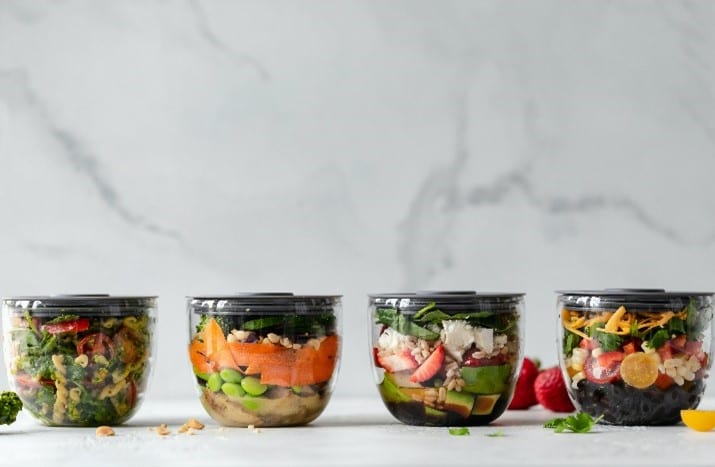Your portion sizes for meals and snacks after bariatric surgery will be significantly smaller than they are pre-surgery. Your new anatomy will only be able to handle around ½ to one cup of food at a time, and this amount may be even smaller in the immediate recovery phase. While this will help you lose weight quickly, it can make meal planning a bit challenging.
Most recipes are based on the average American diet, which will leave you with quite a bit of leftovers. The following tips can help you avoid food spoilage and waste after weight loss surgery:
- Plan smarter. Meal planning can help reduce the stress of figuring out what to eat. However, how you plan can affect how much food you end up throwing away. Making simple meals will allow you to reuse some of the ingredients. For example, you can use shredded rotisserie chicken to make barbecue chicken, Buddha bowls, and stir-fry.
- Be adventurous with leftovers. You’ll quickly tire of eating the same meal over and over again, so it is imperative to find creative ways to reuse them. For example, you can use leftover vegetables in omelets, casseroles, or stir-fries. You can also freeze your leftovers to save them for a day you don’t feel like cooking. Store them in meal-size, microwave-safe containers for greater convenience.
- Recheck your grocery list. You can reduce your grocery bill and reduce food waste by only purchasing the ingredients you need to make your meals. However, you can take this a step further by examining your pantry, fridge, and freezer. You may already have some of the ingredients or similar items you can swap (e.g., a yellow bell pepper vs. an orange bell pepper).
- Opt for frozen produce. Fresh fruits and veggies are excellent options for post-op bariatric patients, but they may spoil faster than you can eat them. If you know you need a particular fruit or vegetable on a recurrent basis, but you can’t eat it all before it spoils, buy it from the freezer section. Typical frozen produce options include edamame, bell peppers, spinach, broccoli, riced cauliflower, blueberries, and strawberries.
- Avoid common storage mistakes. You may prefer to prep your meats, fruits, and vegetables ahead of time so you can eat them straight away. However, slicing or chopping these types of foods spoils them faster. You should also store fruits and vegetables apart from each other, as they expedite each other’s spoilage time.
- Reconsider over-ripe or wilted produce. You may not have to toss some fruits and vegetables that appear too ripe or wilted. For example, you can freeze bananas that have started to turn brown to use in bariatric-friendly baking recipes. You can also revive your wilting leafy greens. Soaking lettuce leaves in cold water for 5-10 minutes can restore their crispness.
- Incorporate older foods first. When stocking your fridge and pantry, put the items that are closest to their use-by date near the front. You should also check the use-by dates when planning your meals. This will help ensure you use those food items before they can spoil.
- Donate foods you won’t eat. You’re going to encounter meals and ingredients you don’t like. However, you don’t have to toss canned or non-perishable food. You can donate it to a local food bank instead to reduce waste.
Food waste isn’t a problem you have to accept after bariatric surgery. Using the suggestions above can prevent spoilage and help save money on your grocery bill. Contact us to learn more about weight loss surgery.





